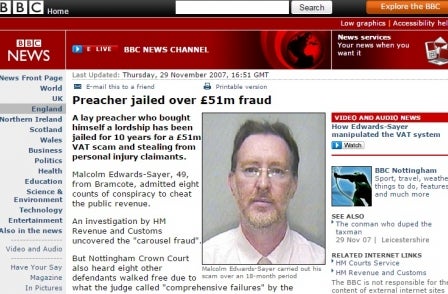
A fraudster has lost his ‘right to be forgotten’ bid against a number of media outlets and been forced to pay their legal costs.
Malcolm Edwards was jailed in 2007 for six-and-a-half years after being involved in a £51m VAT scam.
The BBC reports that he applied for an injunction forcing five media organisations, including the BBC itself, to remove articles about him. He then discontinued this claim and applied for permission to serve proceedings against Google.
This application was rejected by Nottingham County Court last week.
Edwards was ordered to pay the costs of the Nottingham Post, Derby Telegraph and Associated Newspapers, the publisher of the Mail titles, totalling £6,627 each.
He was also ordered to pay the £5,127 costs of the BBC and The Guardian’s £6,859.
According to the BBC, Edwards – who was previously called Malcolm Edwards-Sayer – argued that the continued publication of stories about him interfered with his right to privacy and his ability to lead a normal life.
The original 'right to be forgotten' ruling was passed in the EU Court of Justice in mid-May 2014, allowing individuals to force the removal of links to website articles.
At the end of that month, Google introduced an online form where requests could be made.
In July 2014, Google admitted that it had made 'right to be forgotten' removal mistakes, and that some stories had been reinstated. It also revealed that it was receiving 1,000 take-down requests a day.
If successful, a ‘right to be forgotten’ request will lead to the link to a web page being removed under certain search terms.
In September last year, Press Gazette revealed that more than 80 national press stories had been subject to ‘right to be forgotten’ removals.
The BBC publishes a list – up to date as far as May this year – of its articles that have been affected. They total nearly 200 between May 2014 and May 2015.
Email pged@pressgazette.co.uk to point out mistakes, provide story tips or send in a letter for publication on our "Letters Page" blog
